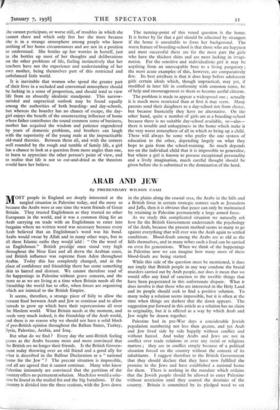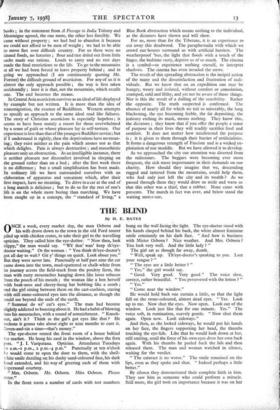ARAB AND JEW
By PREBENDARY WILSON CASH
MOST people in England, are deeply interested at the tangled situation in Palestine today, and the more so because the Arabs were at one time the warm friends of Great Britain. They trusted Englishmen as they trusted no other Europeans in the world, and it was a common thing for an Arab carrying on trade with an Englishman to enter into bargains where no, written word was necessary because every Arab believed that an Englishman's word was his bond. Arabs would swear by Allah and in many other ways, but to all these Islamic oaths they would add : " On the word of an Englishman." British prestige once stood very high throughout the Near East and all down the Arabian coast, and British influence was supreme from Aden throughout Arabia. Today this has completely changed, and in the place of confidence and friendship there has come something akin to hatred and distrust. We cannot therefore read of the happenings in Palestine without grave concern, and the more so as we are living at a time when Britain needs all the Friendship the world has to offer, when forces are organising which are inimical to the British Empire.
It seems, therefore, a strange piece of folly to allow the present feud between Arab and Jew to continue and to allow hatreds to grow up which have their repercussions all over the Moslem world. What Britain needs at the moment, and needs very much indeed, is the friendship of the Arab world, and there is no reason why we should not have a solid block of pro-British opinion throughout the Balkan States, Turkey, Syria, Palestine, Arabia, and Iraq.
But what do we find ? Every day the anti-British feeling grows as the Arabs become more and more convinced that the British are no longer their friends. Is the British Govern- ment today throwing over an old friend and a good ally for what is described in the Balfour Declaration as a " national home for the Jew " ? The present situation is impossible, and all are agreed that it cannot continue. Many who know Palestine intimately are convinced that the partition of the country offers no permanent solution. Much less would a solu- tion be found in the mailed fist and the big battalions. If the country is divided into the three sections, with the Jews down in the plains along the coastal area, the Arabs in the hills and a British force in certain strategic centres such as Jerusalem and Jaffa, then it is obvious that peace can only be maintained by retaining in Palestine permanently a large armed force.
As we study this complicated situation we naturally ask how far the British Government understands the psychology of the Arab, because the present method seems to many to go against everything that will ever win the Arab again to settled conditions. Blood-feuds among the Arabs are as old as the hills themselves, and in many tribes such a feud can be carried on even for generations. When we think of the happenings in Palestine now we can imagine how many more of these blood-feuds are being started.
While this side of the question must be mentioned, it does not imply that British people in any way condone the brutal murders carried out by Arab people, nor does it mean that we would offer any kind of sanction to the terrible things that have been perpetrated in this unfortunate dispute. What it does involve is that those who are interested in the Holy Land and its people should seek to find a positive solution. To many today a solution seems impossible, but it is often at the time when things are darkest that the dawn appears. The suggestion put forward in this article as a solution has no claim to originality, but it is offered as a way by which Arab and Jew might be drawn together.
Palestine had in pre-War days a considerable Jewish population numbering not less than 40,000, and yet Arab and Jew lived side by side happily without conflict and without hatred. And today Arabs and Jews are not in conflict over trade relations or over any racial or religious matters ; they are in conflict simply because of a political situation forced on the country without the consent of its inhabitants. I suggest therefore to the British Government that they should declare that they have now fulfilled the promise to the Jews and have established a national home for them. There is nothing in the mandate which ofdains that the Jewish people should be allowed to enter Palestine without restriction until they control the destinies of the country. Britain is committed by its pledged word to set books ; in the statement from A Passage to India Tolstoy and Montaigne agreed, the one more, the other less forcibly. We came without property ; we had had to abandon it because we could not afford to be men of weight ; we had to be able to move fast over difficult country. For us there were no tinned foods, no luxuries ; flour and rice doled out from little sacks made our rations. Loads to carry and no rest days made the final restrictions to the life. To go to the mountains at all we had been forced to leave property behind ; and in going we approached (I am continuously quoting Mr. Forster) the difficult ground of asceticism. For any of us it is almost the only approach possible ; the way is first taken accidentally ; later it is that, not the mountains, which recalls one. The end becomes the means.
In Central Asia asceticism survives as an ideal of life displayed by example but not written. It is more than the idea of transmigration, the essence of Buddhism. Western attempts to specify an approach to the same ideal read like failures. The story of Christian asceticism is especially hopeless ; it seems to have been mainly a resort for those overwhelmed by a sense of guilt or whose pleasure lay in self-torture. Our experience is less than that of the youngest Buddhist novice; but if I understand it rightly, then the deprivations have no mean- ing; they exist neither as the pain which atones nor as that which delights. Pain is always destructive ; and masochistic pleasure only an obstruction. As an intelligible instance, there is neither pleasure nor discomfort involved in sleeping on the ground rather than on a bed ; after the first week there is no difference ; but a small simplification has been made. In ordinary life we have surrounded ourselves with an elaboration of apparatus and sensations which, after their first impact, have no meaning. To drive in a car at the end of a long march is delicious ; but to do so for the rest of one's life is on the whole more boring than marching. We have been caught up in a concept, the " standard of living," a Blue Book abstraction which means nothing to the individual, as the dictators have shown and will show.
For us, more than for the Tibetans, it is an experience to cut away this deadwood. The paraphernalia with which we crowd our houses surround us with artificial barriers. The weatherproof 'bus, the light that floods with a touch of the finger, the bedtime story, deprive us of so much. The cinema is a symbol—to experience nothing oneself, to interpret shadows. The cinema has even invaded the stews.
The result of this spreading abstraction is the insipid action of the many and the dissatisfaction and frustration of indi- viduals. But we know that on an expedition one may be hungry, weary and isolated, without comfort or consolation, cramped, cold and filthy, and yet not be aware of these things. Nor is this the result of a dulling of the sensibility. Rather the opposite. The truth suspected is confirmed. The absence of nearly all for which we toil so miserably, the lung blackening, the eye becoming feeble, the fat depositing, the jealousy etching its mask, means nothing. They know this, the dictators ; they know that if you offer the people a sense of purpose in their lives they will readily sacrifice food and comfort. It does not matter how misdirected the purpose is ; it is given to them through their barrier of artificialities. It forms a dangerous strength of Fascism and is a wicked ex- ploitation of our muddle. But we have allowed it to develop.
As we approached the city our attention was diverted from the milestones. The beggars were becoming ever more frequent, the sick more importunate in their demands on our charity. How should they imagine that we, descending ragged and tattered from the mountains, could help them, who had only just left the city and its wealth ? As we passed through them they would draw us aside and warn us that this other was a thief, that a robber. None came with presents. The march in fact was over, and below stood the waiting motor-car.










































 Previous page
Previous page